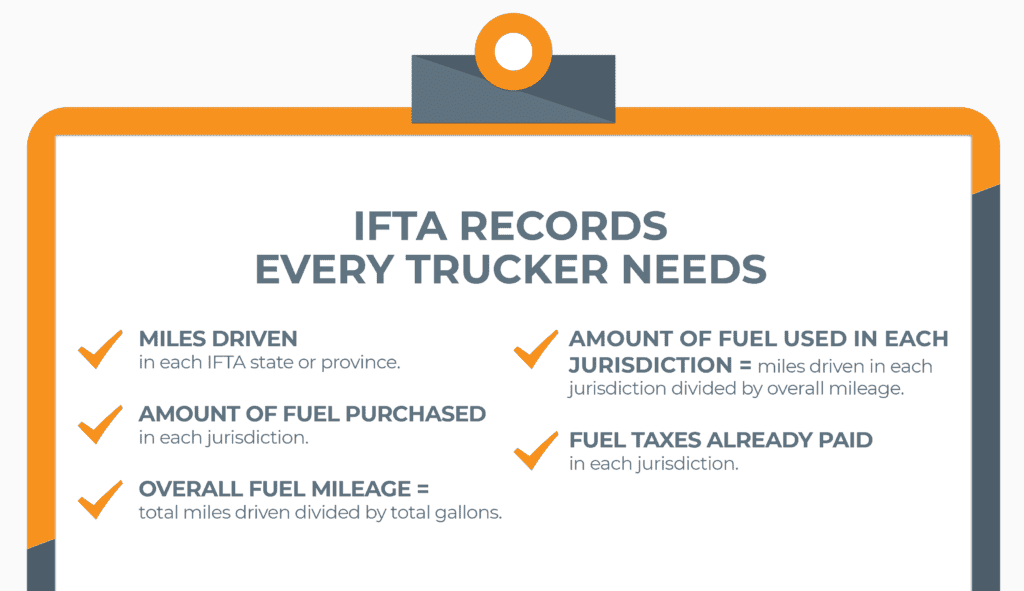Understanding what is IFTA in trucking is crucial for compliance with fuel tax regulations. Trucking companies looking to grow and operate across the US and Canada need to know and comply with IFTA reporting guidelines to avoid costly fines and the possibility of having trucks taken off the road.
Learn what is IFTA in trucking, why it was created, what trucks fall under IFTA jurisdiction, plus how to calculate and file your IFTA return.
What is IFTA and why was it created?
A common question among new drivers is what is IFTA in trucking and where does it apply?
The International Fuel Tax Agreement (IFTA) streamlines the hauling of freight across jurisdictional lines by simplifying the process of collecting and distributing fuel taxes. IFTA is a single fuel tax license used to collect and administer taxes related to fuel usage by commercial motor vehicles operating in the lower forty-eight states (including the District of Columbia) and the ten provinces of Canada.
The history of IFTA began in 1983, but the program wasn’t fully developed and implemented until 1996 when Congress enacted legislation and Canada joined the program. Before IFTA, fuel tax filing was an arduous time-consuming task. Truckers needed to obtain tax permits and file fuel tax returns in each jurisdiction they operated in. That meant dealing with irregular reporting timelines and extensive paperwork. Today, knowing what is IFTA in trucking and how to complete the process provides a simple and unified method to report, pay, and distribute fuel taxes. Fuel tax filing is now streamlined and quick. Trucking companies submit one fuel tax return four times a year, no matter how many IFTA jurisdictions their trucks drive through.
Where does IFTA apply?
Knowing what is IFTA in trucking and where it applies can save companies from costly fines and penalties. Forty-eight states and ten Canadian provinces have joined IFTA.
- Alaska, Hawaii, and the District of Columbia are the only non-members in the USA.
- In Canada, the three northern territories – Yukon, Nunavut, and the Northwest Territories – are not members.
What trucks qualify for an IFTA license?
Companies need to educate their staff on what is IFTA in trucking and what trucks qualify to avoid legal issues. The following types of trucks fall under IFTA regulations:
- Two axle trucks weighing more than 11,797 kg (26,000 pounds).
- Three or more axle trucks, no matter the weight.
- Trucks that weigh more than 11,797 kg (26,000 pounds) when pulling a trailer.
Applying for a license
Trucking companies must apply for IFTA status in the state or province where they’re based. Each IFTA license is valid for one year, expiring December 31, and covers one truck.
IFTA decals
Companies need to educate their staff on what is IFTA in trucking and how to identify registered trucks to avoid legal issues. Every IFTA-licensed truck need two decals. Each must be placed on the lower rear area of the side of the cab on each side of the truck. IFTA Decals are valid from January 1 to December 31 of each year. The truck’s IFTA license – or a photocopy – must also be kept inside the truck.
When are IFTA reports due?
Knowing what is IFTA in trucking and when to report can save companies from costly fines and penalties. IFTA returns are due on the last day of the month at the end of each quarter. Here are the key IFTA dates for 2023:
| Reporting Period | Due Dates |
| January – March 2023 | April 30 |
| April – June 2023 | July 31 |
| July – September 2023 | October 31 |
| October – December 2023 | January 31 |
Calculating IFTA and submitting returns
Knowing what is IFTA in trucking, understanding its importance, and how to submit reports can enhance your company’s efficiencies in meeting the industry’s regulatory requirements. Some jurisdictions calculate IFTA returns digitally after you input your fuel costs and mileage, while others require you to calculate returns manually.
Here’s how to manually calculate your fleet’s IFTA returns on a per-truck basis:
- Determine the miles traveled in each jurisdiction during the tax reporting period.
- Accurately account for the total number of gallons of fuel purchased in each jurisdiction throughout the quarter.
- Determine the fuel usage per jurisdiction by dividing the total miles driven in that jurisdiction by your truck’s average miles per gallon.
- Find the tax rates for each jurisdiction your IFTA-licensed trucks drive through in that reporting period.
- Calculate the tax amount for each jurisdiction by multiplying the total gallons of fuel consumed in each jurisdiction by its fuel tax rate. The sum is the tax owed for each state and province.
- Calculate the total tax owed for each jurisdiction by subtracting any fuel tax already paid during the quarter in that state or province.
- If a jurisdiction levies a fuel tax surcharge, you must calculate the surcharge tax owed by multiplying the gallons consumed in that jurisdiction by the surcharge rate.
- Process your IFTA quarterly tax return in the jurisdiction your trucking company is based. Your jurisdiction will distribute taxes owed to each state and province your truck operated in during the reporting period.
IFTA-licensed carriers can file their quarterly tax returns online and submit payment. Licensees must complete the application for online filing of the IFTA Quarterly Tax Return and register for online return submission to utilize the online return and payment tools. To ensure available funds to pay taxes when due, many trucking companies depend on freight factoring to accelerate cash flow and provide easy access to working capital.
What if you submit IFTA late?
Trucking companies might have to pay $50 or 10% of the unpaid taxes — whatever’s more — if you:
- Fail to file fuel tax returns for fuel used in each jurisdiction.
- Fail to file returns by the deadline.
- Fail to pay the full tax balance.
IFTA compliance and auditing
Each jurisdiction monitors drivers and trucking companies for IFTA compliance. Inspectors might stop your truck to check IFTA registration, verify a carrier’s account status with its base jurisdiction, and take fuel samples.
Also, each jurisdiction must agree to audit, on average, 3 percent of its carriers annually. Keep the following records updated and accessible to prepare for possible audits:
- Distance records: When, where, and how far your IFTA-decaled vehicles have traveled.
- Fuel Records: All fuel your fleet has used.
- Fuel Purchases: Dates, quantities, type, price, and the seller of fuel purchased, as well as the I.D. of each vehicle for which it was used.
- Storage and fuel withdrawal records: For bulk storage facilities.
For new drivers, learning what is IFTA in trucking helps ensure records are current, accurate, and available.
Streamlining IFTA record-keeping
Trucking company owners and fleet managers often need to rummage through several month’s worth of mileage and fuel use reporting as the IFTA deadline approaches. Training sessions to emphasize what is IFTA in trucking and its importance helps your company and drivers stay organized and compliant.
To save time, many trucking companies now use a Transport Management Software (TMS) program with IFTA reporting capabilities to make the process easier, more efficient, and less time-consuming. Another efficiency solution is the use of fuel cards. Leading fuel card programs provide discount pricing on diesel, track expenses and simplify reporting.
Conclusion
A common question among new drivers is what is IFTA in trucking and its benefits. The answer is simplicity. What was once a complex and time-consuming process, IFTA has now simplified to streamline the reporting and paying of fuel taxes in the various states and provinces your truck(s) operate in. If your trucking company operates across multiple jurisdictions, be sure to comply with IFTA regulations to avoid citations, penalties, and the possibility of having your truck(s) pulled off the road.
When preparing for IFTA reporting, be organized, and detailed to ensure the accurate recording of all fuel related data. On-time reporting with accurate and complete submissions will minimize the chances of an IFTA audit and keep your trucking company in good standing with the tax man.
For more information on what is IFTA in trucking, and how to manage cash flow to prepare for tax payments, contact us today.
Key Takeaways
- Understanding what is IFTA in trucking is crucial for compliance with fuel tax regulations.
- Learn what is IFTA in trucking, why it was created, what trucks fall under IFTA jurisdiction, plus how to calculate and file your IFTA return.
ABOUT eCapital
At eCapital, we accelerate business growth by delivering fast, flexible access to capital through cutting-edge technology and deep industry insight.
Across North America and the U.K., we’ve redefined how small and medium-sized businesses access funding—eliminating friction, speeding approvals, and empowering clients with access to the capital they need to move forward. With the capacity to fund facilities from $5 million to $250 million, we support a wide range of business needs at every stage.
With a powerful blend of innovation, scalability, and personalized service, we’re not just a funding provider, we’re a strategic partner built for what’s next.





